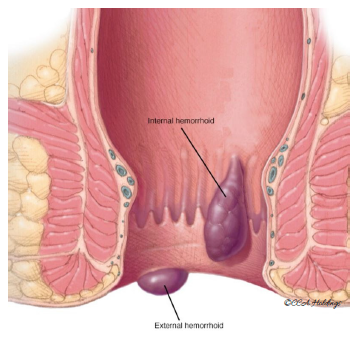Mount Elizabeth Novena Hospital #10-48/49
WHAT ARE HAEMORRHOIDS?
Haemorrhoids are also known as piles. Although they can be unpleasant and painful, they can be easily treated and are very preventable.
Hemorrhoids can occur both internally inside the anus and externally, under the skin of the anus.
Haemorrhoids are most common among adults aged 45-65. However, this does not mean that young people and children do not get them.
Women often develop them during pregnancy.
WHAT CAUSES HAEMORRHOIDS/PILES?
When blood vessels within the anal cushions in the rectum are dilated or engorged with blood, they swell and enlarge, becoming what are known as haemorrhoids.
They occur due to the following reasons:
- Aging
- Pregnancy
- Chronic diarrhea
- Chronic constipation – from straining to defecate
- Sitting for long periods on the toilet bowl
- Obesity
- Genetics – some people inherit a tendency to develop haemorrhoids
Internal haemorrhoids, which lie inside the rectum may cause painless rectal bleeding or prolapse.
External haemorrhoids
will lie under the skin around the anus. They can become very itchy and may bleed. Sometimes, blood may accumulate and form a thrombus (clot), which can be painful. The area will be swollen and inflamed.
HOW ARE HAEMORRHOIDS COMMONLY TREATED?
Rubber Band Ligation
A rubber band is placed around the base of the haemorrhoid inside the anal canal. The band cuts off blood supply to the haemorrhoid which then shrivels and falls off in 3-4 days.
Injection Sclerotherapy
The surgeon passes a short instrument into the anal canal and injects an oily solution into the top of the haemorrhoid. This causes inflammation at the base of the haemorrhoid, resulting in scarring, thereby reducing the size of the haemorrhoid.
Transanal Haemorrhoidal Dearterialization
This is a form of surgery that does not involve removal of haemorrhoidal tissue. The surgeon identifies the blood vessels supplying the haemorrhoids with a doppler ultrasound, and sutures the supplying blood vessels. This causes the haemorrhoids to shrink.
Haemorrhoidectomy
An incision is made to remove the haemorrhoids. This is performed using a scalpel, scissors, or electrocautery. The wounds may be left open to granulate over or sutured closed.
Stapled Haemorrhoidectomy
A circular stapling device is used to remove a ring of excess haemorrhoidal tissue. This disrupts the blood supply and also hitches the cushions back to their normal position within the anal canal.
SHOULD YOU UNDERGO HAEMORRHOIDS/PILES SURGERY?
These are some of the factors you should consider when deciding if you should get surgical treatment for your haemorrhoids.
Severity of Symptoms
Surgery may be recommended if you experience severe pain, bleeding, or prolapse (when haemorrhoids protrude from the anus) that significantly impacts your quality of life and does not respond to conservative treatments.
Impact on Daily Life
If haemorrhoids are interfering with your ability to perform daily activities, such as sitting, walking, or working, surgery may be a viable option to alleviate symptoms and improve your overall well-being.
Failed Conservative Treatments
If you've already tried conservative measures such as dietary changes, topical treatments, and lifestyle modifications without success, surgery might be the next step to achieve long-term relief.
Chronic Nature of Symptoms
For individuals experiencing chronic or recurrent episodes of haemorrhoids, surgery may offer a more permanent solution compared to temporary symptom management through non-surgical methods.
Medical Advice
Consultation with a professional is crucial in determining whether surgery is the most appropriate course of action based on your individual medical history, symptoms, and overall health.
WHAT IS THE COST OF HAEMORRHOIDS/PILES SURGERY IN SINGAPORE?
The cost of haemorrhoid surgery in Singapore can vary depending on several factors, including the type of procedure performed, the complexity of the surgery, the healthcare provider or hospital chosen, and any additional services or amenities provided.
You should speak to your doctor or piles specialist and get an estimate based on your condition and health needs.
WHAT TO LOOK OUT FOR AFTER HAEMORRHOIDS/PILES SURGERY?
While most individuals experience a smooth recovery following haemorrhoid treatment, it's crucial to be aware of potential issues that may arise. Here are some key factors to consider and monitor during the post-operative period:
Pain Management
It's normal to experience some discomfort or pain after haemorrhoid surgery, which can be managed with prescribed pain medications and other conservative measures recommended by your healthcare provider. However, if the pain becomes severe or is not adequately controlled with medication, it may indicate a complication such as infection or excessive swelling.
Bleeding
Some bleeding is common immediately after haemorrhoid surgery, but it should gradually decrease over time. However, if you experience persistent or excessive bleeding, such as bright red blood in the stool or on the toilet paper, it could indicate a complication such as a wound reopening or an infection. Contact your healthcare provider promptly if you notice any unusual bleeding.
Swelling and Discomfort
Swelling and discomfort around the surgical site are normal after haemorrhoid surgery and should gradually improve as you recover. However, if you experience worsening swelling, severe pain, or the development of a firm lump near the anus, it may indicate a complication such as a blood clot (thrombosis) or an abscess. Notify your healthcare provider if you have concerns about swelling or discomfort.
Difficulty Urinating or Defecating
Some individuals may experience temporary difficulty urinating or having a bowel movement after haemorrhoid surgery, particularly if they have undergone more invasive procedures such as haemorrhoidectomy. If you experience persistent difficulty urinating or passing stool, or if you develop symptoms such as urinary retention or constipation, seek medical attention promptly.
Infection
Signs of infection at the surgical site may include increased pain, redness, warmth, swelling, or drainage of pus. If you suspect that you may have an infection, contact your healthcare provider immediately for evaluation and treatment, as prompt intervention is essential to prevent complications.
Fever
A low-grade fever is common in the immediate post-operative period and is often a normal response to surgery. However, if you develop a high fever (above 101°F or 38.3°C) or experience chills, it may indicate an infection or other underlying issue requiring medical attention.
Follow-up Appointments
Attend all scheduled follow-up appointments with your healthcare provider to monitor your progress, address any concerns or complications, and ensure proper healing. Your healthcare provider may recommend additional treatments or modifications to your care plan based on your individual needs and recovery status.
CALL YOUR DOCTOR IMMEDIATELY IF YOU EXPERIENCE THESE SYMPTOMS
Contact your doctor immediately if you:
- Notice rectal bleeding
- Have severe abdominal pain
- Develop a fever
- Feel very dizzy
- Experience vomiting
- Experience abdominal distention





